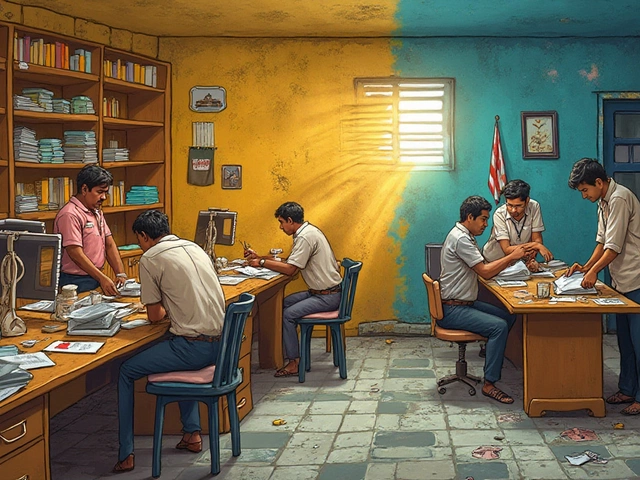
Ask any ambitious student in India about their dream college, and the Indian Institutes of Technology—better known as IITs—almost always come up. The chase for an IIT seat is more than just a badge of honor. It’s often seen as a ticket to world-class education, top salaries, and a future full of possibilities. But the big question—what is the best subject if you want to get into IIT? Every year, lakhs of Class 10 students stand at a crossroads, worried that their choice will make or break their chances. The truth: there’s both freedom and pressure built into these decisions. The tension isn’t just about which subject is best—it’s about setting up for success, both for the entrance exam (JEE Advanced or JEE Mains) and for the years after. Let’s break down exactly how your subject choices shape your IIT journey, which ones truly matter, and where students go wrong (or right!).
Core Subjects that Unlock the IIT Door
If you’ve talked to anyone who has cracked JEE, you know there’s no escaping Physics, Chemistry, and Maths. Choosing PCM in your 11th and 12th is absolutely non-negotiable if IIT is your goal. This trio isn’t just tradition; it’s the only way. IIT JEE—the only route to an IIT seat—tests only these three subjects. No matter how good you might be at Biology, Computer Science, or Economics, these won’t get you directly to IIT engineering programs.
Let’s get into each subject. Maths forms the backbone. About 33% of the exam focuses on it, and it’s directly linked to engineering reasoning and aptitude. Physics is next, dealing with problem-solving, real-world logic, and scientific principles. Chemistry, often (wrongly) seen as the ‘memory’ subject, plays a decisive role because it wraps theory, application, and analytical skills together. If you analyze previous years’ question papers, topics like Calculus (from Maths), Mechanics (from Physics), and Organic Chemistry come up over and over. Data from the past five years (see table below) show most top scorers are equally strong across all three—no room for weak links.
| Subject | Average JEE Score (Top 500) | No. of Questions (%) |
|---|---|---|
| Mathematics | 86 | 33 |
| Physics | 78 | 33 |
| Chemistry | 83 | 34 |
Still hoping to skip Chemistry or ease up on Maths? Not possible if you want to clear cut-offs. Anecdote: In 2023, around 70% of students who cleared JEE Advanced and got a seat in the top 5 IITs had all three subjects in Class 12 with strong marks (over 85% in each). It’s a tough truth, but that’s how the system is built.
Choosing the Right Stream: Science vs. Commerce & Humanities
Let’s talk about the path you start on in Class 11. If you think you can slide into IIT from Commerce or Humanities, here’s the reality check: every IIT BTech program requires Physics, Chemistry, and Maths (PCM). There’s just no shortcut. The Joint Entrance Exam (JEE Mains + Advanced) syllabus draws straight from CBSE or state Science curricula. Students who pick Commerce or Humanities often end up out of the competition before it even starts.
Schools across India offer flexibility, but not unlimited freedom. Some schools might give you options for Fourth or Fifth subjects (like Computer Science or Physical Education), but PCM is the foundation. Here’s where students get strategic: choosing Computer Science as an extra elective can help practice problem-solving and coding basics, both of which are handy if you land up in Computer Science at IIT. However, scoring high in the main three subjects must be the priority.
Why so much focus on Science? Because almost every core concept in engineering, from circuit theory to thermodynamics, pulls from your Class 11 and 12 PCM syllabus. Even the official NTA (National Testing Agency) guidelines confirm eligibility as “must have passed qualifying exam with PCM as core subjects.” Here’s a typical mistake: underestimating Chemistry, thinking the real action is with Physics and Maths. Actually, in tie-breakers or cut-off situations, Chemistry scores often make the final call for who gets a seat.

Tips to Maximize Your Subject Advantage for IIT
Now, let’s get practical. Having PCM on your mark sheet is just the starting point. The real game is how you use those subjects to your advantage for the JEE exams. Here are some tried-and-tested strategies that real toppers have swore by (and backed up with stats):
- Don’t treat any of the three subjects as less important. Each carries equal weight—slacking on one can mess up your total.
- Focus on concepts, not just rote learning. For Physics, build intuition with real-life experiments, get hands-on, and break problems down visually. For Chemistry, focus on reaction mechanisms and practice with equation balancing (helps big time in Organic and Physical Chemistry). In Maths, master core formulas and their derivations before jumping into shortcuts.
- Mock tests every week help you spot your weak subject early. Toppers who took weekly subject-wise tests in all three areas improved average scores by 13–18% within six months (data from a top Delhi coaching survey, 2024).
- If you choose a fourth or fifth subject like Computer Science or Fine Arts, use that time to recharge—just don’t cut corners in the main trio.
- Track your subject-wise scores over mock exams. If you notice one lagging (e.g., Chemistry consistently 15 marks below Maths), realign your study hours and get extra help from a teacher.
- Stay updated—recent years have seen a shift toward application-based (not formula-based) questions, especially in Physics and Chemistry.
Fact: The 2022 JEE Advanced saw almost 60% of Physics questions requiring application, not simple memory recall. Prep accordingly.
The Debate: Is There a 'Best' Subject for IIT at All?
This is usually where the arguments start. Some parents say Maths is the ticket, others swear by Physics. A few hope Chemistry will be the tie-breaker. Here’s how it actually plays out: IIT wants thinkers, not subject specialists. The best subject for IIT isn’t about choosing Chemistry over something else—it’s about building all three together. There really isn’t one subject that gives you an outsized advantage. The IIT system is wired to reward balanced preparation.
Still, if you’re hoping to match your future IIT branch with a favorite subject, there’s room for some personal strategy. Love Coding and dream of Computer Science? Then along with PCM, make Computer Science your elective and dig deeper till you’re comfortable with C++, Python, or Java basics. If you’re fascinated by bridges or skyscrapers, give extra attention to Mechanics in Physics—it’ll help big time in the Civil or Mechanical Engineering streams later.
For students worried about Biology: you can still opt for Biology with PCM as a fourth subject, but cracking JEE only needs the first three. However, if you have an outside shot at biotechnology or dual-degree programs at IIT, having Biology as a backup sometimes helps.
Take it from the 2021 AIR 5 (All India Ranker): “I was a Physics fanboy since Class 8, but I realized no one cares about favorites in JEE; what matters is how well you can integrate skills from all three. The best subject is the combo, not a single stream.” That’s the hard-earned truth every topper ends up learning the not-so-easy way.
More Articles

Understanding Low Salaries in Government Services and Their Impact
The article dives into the reasons behind low salaries for government services, focusing on factors like budget constraints and traditional pay structures. It also explores how these salaries compare to the private sector and the implications for job seekers. Tips for aspiring government employees to navigate these challenges are included. The piece aims to help readers make informed decisions on pursuing government careers.

High‑Pay Jobs You Can Land After 3 Months of Learning
Learn which high‑pay skills you can master in three months, the best platforms, portfolio tips, and a step‑by‑step job‑search plan to land a role fast.

Which Branch of MBBS Is Highest Paid? Your Guide to Smart Career Choices
Trying to pick the highest paid branch after MBBS? This article breaks down which specialties top the salary charts and what influences doctors' pay in India. It covers how competition, demand, private vs government jobs, and additional qualifications can change your earning potential. Get useful facts, real-world salary ranges, and tips for making a smart choice after NEET. Make a practical plan for a rewarding medical career beyond the entrance test.
